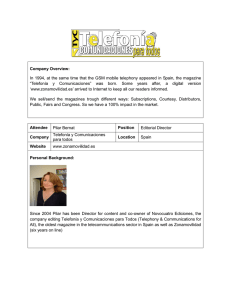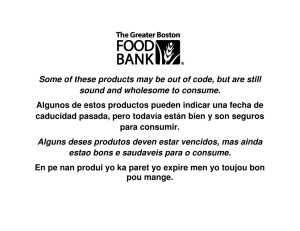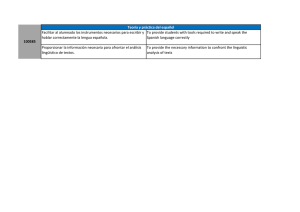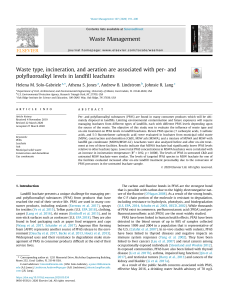National factsheet on separate collection Spain
Anuncio
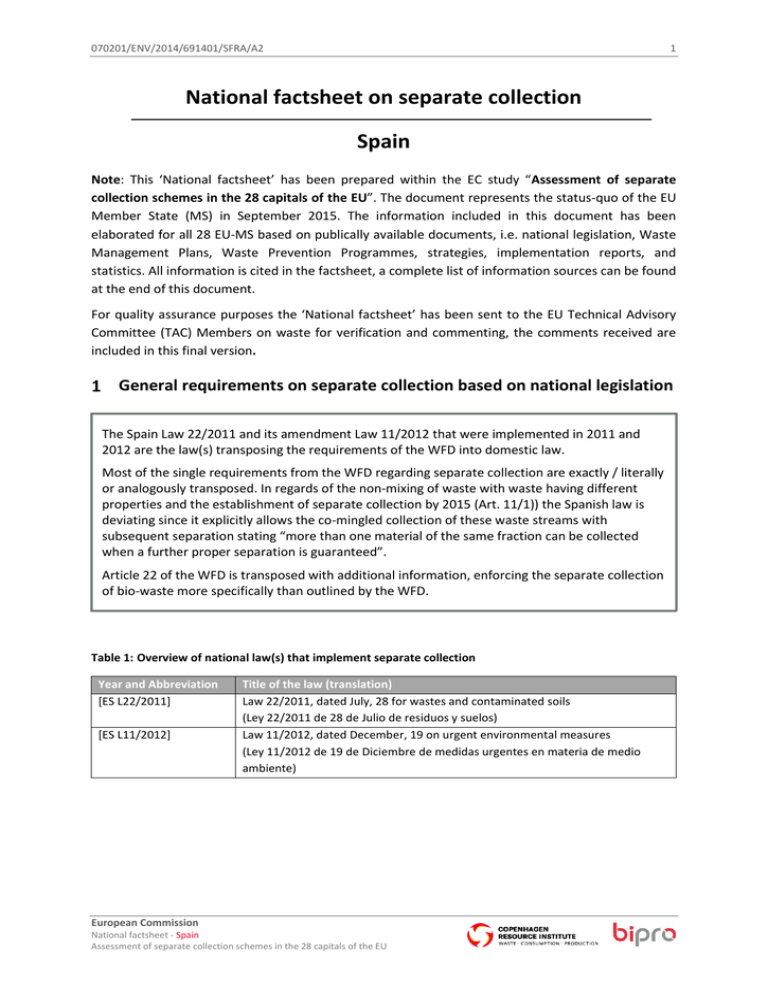
070201/ENV/2014/691401/SFRA/A2 1 National factsheet on separate collection Spain Note: This ‘National factsheet’ has been prepared within the EC study “Assessment of separate collection schemes in the 28 capitals of the EU”. The document represents the status-quo of the EU Member State (MS) in September 2015. The information included in this document has been elaborated for all 28 EU-MS based on publically available documents, i.e. national legislation, Waste Management Plans, Waste Prevention Programmes, strategies, implementation reports, and statistics. All information is cited in the factsheet, a complete list of information sources can be found at the end of this document. For quality assurance purposes the ‘National factsheet’ has been sent to the EU Technical Advisory Committee (TAC) Members on waste for verification and commenting, the comments received are included in this final version. General requirements on separate collection based on national legislation The Spain Law 22/2011 and its amendment Law 11/2012 that were implemented in 2011 and 2012 are the law(s) transposing the requirements of the WFD into domestic law. Most of the single requirements from the WFD regarding separate collection are exactly / literally or analogously transposed. In regards of the non-mixing of waste with waste having different properties and the establishment of separate collection by 2015 (Art. 11/1)) the Spanish law is deviating since it explicitly allows the co-mingled collection of these waste streams with subsequent separation stating “more than one material of the same fraction can be collected when a further proper separation is guaranteed”. Article 22 of the WFD is transposed with additional information, enforcing the separate collection of bio-waste more specifically than outlined by the WFD. Table 1: Overview of national law(s) that implement separate collection Year and Abbreviation [ES L22/2011] [ES L11/2012] Title of the law (translation) Law 22/2011, dated July, 28 for wastes and contaminated soils (Ley 22/2011 de 28 de Julio de residuos y suelos) Law 11/2012, dated December, 19 on urgent environmental measures (Ley 11/2012 de 19 de Diciembre de medidas urgentes en materia de medio ambiente) European Commission National factsheet - Spain Assessment of separate collection schemes in the 28 capitals of the EU 070201/ENV/2014/691401/SFRA/A2 Table 2: Overview on evaluation categories Evaluation Explanation additional The requirements of the WFD have been transposed and additional information or requirements are set out in the national legal requirement, i.e. additional definition, precision of requirement that goes beyond the text of the WFD one:one The requirement of the WFD has been transposed exactly / literally or transposed analogously. No additional requirements or explanations are set out. deviating The requirements of the WFD have been implemented into national legal requirements but have been adjusted, left out or deviated not included The requirement of the WFD is not transposed into national law European Commission National factsheet - Spain Assessment of separate collection schemes in the 28 capitals of the EU 2 070201/ENV/2014/691401/SFRA/A2 3 Table 3: Assessment on national transpositions Law & Article Evaluation English text Original text 1. Article 3 (11) WFD: Definition separate collection: "‘separate collection’ means the collection where a waste stream is kept separately by type and nature so as to facilitate a specific treatment" [ES L22/2 011] Article 3 Section o 3 Section o "Separate Collection: The collection in which a waste flow is kept separate, in accordance to the type and character to facilitate its specific treatment." 2. Article 10 (2) WFD: “waste shall not be mixed with other waste/material with other properties” «Recogida separada»: la recogida en la que un flujo de residuos se mantiene por separado, según su tipo y naturaleza, para facilitar un tratamiento específico. [ES L22/2011] Article 21 (4) 21 (4) “Las autoridades ambientales en su respectivo ámbito competencial adoptarán las medidas necesarias para asegurarse de que los residuos se sometan a operaciones de valorización. Cuando sea necesario para facilitar o mejorar la valorización, los residuos se recogerán por separado y no se mezclarán con otros residuos u otros materiales con propiedades diferentes.” one:one One:one 21 (4) "Environmental authorities shall – according to their competence - take the necessary measures to ensure that waste undergoes recovery operations. Where necessary to facilitate or improve recovery, waste shall be collected separately and shall not be mixed with other waste or other material with different properties. 3. Article 11 (1) WFD: “measures to promote high quality recycling” [ES L22/2011] Article 21 (2) One:one 21 (2) "Environmental authorities shall – according to their competence - adopt measures in order to promote high quality recycling: A separate collection scheme of waste should be implemented, also covering waste oils, where technically, environmentally and economically practicable and adequate, to meet the necessary quality criteria needed for the relevant recycling sectors.” 21 (2) “Las autoridades ambientales en su respectivo ámbito competencial tomarán medidas para fomentar un reciclado de alta calidad y, a este fin, se establecerá una recogida separada de residuos, entre otros de aceites usados, cuando sea técnica, económica y medioambientalmente factible y adecuada, para cumplir los criterios de calidad necesarios para los sectores de reciclado correspondientes.” 4. Requirement WFD: 11 (1) “separate collection if technically practicable” [ES L22/2011] Article 21 (2) One:one 21 (2) "Environmental authorities according to their competence shall adopt measures in order to promote high quality recycling, by this mean, a separate collection scheme of waste should be implemented, including waste oils, where technically environmentally and economically practicable and adequate, to meet the necessary quality criteria needed for European Commission National factsheet - Spain Assessment of separate collection schemes in the 28 capitals of the EU 21 (2) “Las autoridades ambientales en su respectivo ámbito competencial tomarán medidas para fomentar un reciclado de alta calidad y, a este fin, se establecerá una recogida separada de residuos, entre otros de aceites usados, cuando sea técnica, económica y medioambientalmente factible y adecuada, para 070201/ENV/2014/691401/SFRA/A2 Law & Article 4 Evaluation English text Original text the relevant recycling sectors.” cumplir los criterios de calidad necesarios para los sectores de reciclado correspondientes.” 5. Requirement WFD: 11 (1) “separate collection if economically practicable” [ES L22/2011] Article 21 (2) One:one 21 (2) "Environmental authorities according to their competence shall adopt measures in order to promote high quality recycling, by this mean, a separate collection scheme of waste should be implemented, including waste oils, where technically environmentally and economically practicable and adequate, to meet the necessary quality criteria needed for the relevant recycling sectors.” 21 (2) “Las autoridades ambientales en su respectivo ámbito competencial tomarán medidas para fomentar un reciclado de alta calidad y, a este fin, se establecerá una recogida separada de residuos, entre otros de aceites usados, cuando sea técnica, económica y medioambientalmente factible y adecuada, para cumplir los criterios de calidad necesarios para los sectores de reciclado correspondientes.” 6. Requirement WFD: 11 (1) “separate collection if environmentally practicable” [ES L22/2011] Article 21 (2) One:one 21 (2) "Environmental authorities according to their competence shall adopt measures in order to promote high quality recycling, by this mean, a separate collection scheme of waste should be implemented, including waste oils, where technically environmentally and economically practicable and adequate, to meet the necessary quality criteria needed for the relevant recycling sectors.” 21 (2) “Las autoridades ambientales en su respectivo ámbito competencial tomarán medidas para fomentar un reciclado de alta calidad y, a este fin, se establecerá una recogida separada de residuos, entre otros de aceites usados, cuando sea técnica, económica y medioambientalmente factible y adecuada, para cumplir los criterios de calidad necesarios para los sectores de reciclado correspondientes.” 7. Article 11 (1) WFD: “separate collections (…) appropriate to meet the necessary quality standards for the relevant recycling sectors” [ES L22/2011] Article 21 (2) One:one 21 (2) "Environmental authorities according to their competence shall adopt measures in order to promote high quality recycling, by this mean, a separate collection scheme of waste should be implemented, including waste oils, where technically environmentally and economically practicable and adequate, to meet the necessary quality criteria needed for the relevant recycling sectors.” European Commission National factsheet - Spain Assessment of separate collection schemes in the 28 capitals of the EU 21 (2) “Las autoridades ambientales en su respectivo ámbito competencial tomarán medidas para fomentar un reciclado de alta calidad y, a este fin, se establecerá una recogida separada de residuos, entre otros de aceites usados, cuando sea técnica, económica y medioambientalmente factible y adecuada, para cumplir los criterios de calidad necesarios para los sectores de reciclado correspondientes.” 070201/ENV/2014/691401/SFRA/A2 Law & Article 5 Evaluation English text Original text 8. Article 11 (1) WFD “by 2015 separate collection shall be set up for at least the following: paper, metal, plastic and glass” [ES L22/2011] Article 21 (2) deviating 21 (2) "Before 2015 a separate collection scheme should be in force for at least: paper, metals, plastics and glass. The separate collection schemes that exist can be adapted to the separate material collection referred to in the last paragraph. More than one material of the same fraction can be collected when a further proper separation is guaranteed as long as it doesn’t suppose a reduction of quality of the obtained materials nor an increase in cost." 21 (2) “Antes de 2015 deberá estar establecida una recogida separada para, al menos, los materiales siguientes: papel, metales, plástico y vidrio. Los sistemas de recogida separada ya existentes se podrán adaptar a la recogida separada de los materiales a los que se refiere el párrafo anterior. Podrá recogerse más de un material en la misma fracción siempre que se garantice su adecuada separación posterior si ello no supone una pérdida de la calidad de los materiales obtenidos ni un incremento de coste.” 9. Article 22 WFD: Bio-waste - Member states shall take measures, as appropriate (…) to encourage: “a) the separate collection of bio-waste with a view to the composting and digestion of bio-waste” [ES L22/2001] Article 24 24 “Local environmental authorities shall promote, without prejudice, measures arising of actions to be undertaken at Community level pursuant to the last paragraph of the article 22 of Directive 2008/98/EC. These measures could be included in the plans and programs for waste management under Article 14, to promote: additional a) Separate collection of bio-waste for composting or anaerobic digestion in particular of the plant fraction, biowaste from large generators and bio-waste from households. b) Domestic and community composting. c) Processing of separately collected bio-waste in a way that a high degree of environmental protection is achieved in the specific treatment facilities without mixing bio-waste with already mixed waste in the process. Where appropriate, the authorisation of such facilities shall include details on technical requirements for the proper treatment of bio-waste and the quality of the materials European Commission National factsheet - Spain Assessment of separate collection schemes in the 28 capitals of the EU 24 “Las autoridades ambientales promoverán, sin perjuicio de las medidas que se deriven de las actuaciones que a nivel comunitario se emprendan en cumplimiento del último párrafo del artículo 22 de la Directiva 2008/98/CE, medidas que podrán incluir en los planes y programas de gestión de residuos previstos en el artículo 14, para impulsar: a) La recogida separada de biorresiduos para destinarlos al compostaje o a la digestión anaerobia en particular de la fracción vegetal, los biorresiduos de grandes generadores y los biorresiduos generados en los hogares. b) El compostaje doméstico y comunitario. c) El tratamiento de biorresiduos recogidos separadamente de forma que se logre un alto grado de protección del medio ambiente llevado a cabo en instalaciones específicas sin que se produzca la mezcla con residuos mezclados a lo largo del proceso. 070201/ENV/2014/691401/SFRA/A2 Law & Article Evaluation 6 English text Original text obtained. En su caso, la autorización de este tipo de instalaciones deberá incluir las prescripciones técnicas para el correcto tratamiento de los biorresiduos y la calidad de los materiales obtenidos. European Commission National factsheet - Spain Assessment of separate collection schemes in the 28 capitals of the EU 070201/ENV/2014/691401/SFRA/A2 7 General requirements on separate collection based on main strategies Spain 463 kg MSW/capita 27.21% recycling Definition of Municipal solid waste (MSW): Article 3 [ES L22/2001] defines Domestic waste: waste generated in households as a consequence of domestic activities and similar waste generated in industry and services. This category also includes other wastes generated in households such as WEEE, clothes, batteries and accumulators, furniture and waste and debris from minor building and reparation works. Waste coming from street-cleaning, green and recreational areas-cleaning and beach-cleaning, as well as dead domestic animals and abandoned vehicles will also be considered domestic waste. Commercial waste: waste generated by wholesale and retail commercial activities of restoration services, bars, offices and markets as well as waste from the rest of the service sector. The Autonomous communities (regions) of Spain have slightly different definitions for municipal waste. However, the national definition is closer to the Eurostat definition. It includes household waste and commercial waste that is similar to household waste. Commercial waste that is managed privately is excluded from MSW. Nevertheless, if municipalities decide to undertake the collection and management, then this waste amount is included in MSW (it depends on the municipalities and regions) [ES MSW Modelling Tool 2014]. Main strategies implementing separate collection The two main strategies implementing separate collection are the Spanish Waste Prevention Programme [ES WPP 2013] and the Waste Management Plan [ES WMP 2009]. The National Waste Prevention Plan for Spain was published on November 27, 2013. The coverage of the Waste Prevention Plan is the period 2014-2020. The autonomous regions of Spain prepare their own plans and programs which have to follow at minimum of the national plan requirements. The plans of the autonomous regions tend to cover shorter periods of time, having an end date between 2010 and 2015, depending on the region [ES WPP 2013]. A new National Waste Management Plan (PEMAR) is in the process of approval1 [ES TAC 2015] but has not been considered for this assessment as it is not approved yet. The main targets of the Spanish National Waste Management Plan are to stabilise waste generation as a first step and subsequently try to reduce it and to raise the recycling rates of the MSW streams [ES WMP 2009]. There is a current understanding that some regions may have different collection systems. Each municipality has the responsibility to decide how to best fulfil the targets. The Ministry of Agriculture Food and the Environment is responsible for proposing new measures or changes to the existing collection systems. In general, before changes can be approved, they are subject to discussion by the regional parliament and public consultation [ES WMP 2009]. 1 http://www.magrama.gob.es/es/calidad-y-evaluacion-ambiental/participacion-publica/Residuos-2015Proyecto-Plan-Estatal-Marco-Gestion-Residuos-Estudio-Ambiental-Estrategico.aspx European Commission National factsheet - Spain Assessment of separate collection schemes in the 28 capitals of the EU 070201/ENV/2014/691401/SFRA/A2 Recycling in Spain has improved over the last 10 years showing an increase of more than 10% from 21% in 2001, to 33% in 2010. Despite this progress, an great effort is still required if Spain is to meet the target of 50% recycling rate as set in the Waste Framework Directive for 2020 [ES WPP 2013]. The first and second National Municipal Solid Waste Management Plans have been instrumental in the development of MSW recycling by introducing several initiatives, from separate collection of recyclables to upgrading recycling facilities, and many more [ES WPP 2013]. In relation to the use of taxes, several Regional Authorities have implemented landfill taxes or fees. However there are significant differences between them: the type of waste to which it applies, the allocation of the collected taxes, the tax rate, the taxable event and the results obtained. Only Catalonia has implemented a fee for incineration. It should be pointed out that fees for landfill and incineration have played a key role in the changes in municipal waste management in Catalonia, in particular supporting the implementation of separate collection of biowaste and other materials [ES TAC 2015]. European Commission National factsheet - Spain Assessment of separate collection schemes in the 28 capitals of the EU 8 070201/ENV/2014/691401/SFRA/A2 Implementation of separate collection Overview on separate collection systems in place The Spanish separate collection system relies mostly on bring points, the uses of door-to-door collection is very limited. The most common and widely used system for the collection of MSW in Spain is the bring point. As the Spanish MSW management is subject to the Autonomous Communities of Spain (regional level), the different bring point systems present certain differences. There are currently three types of bring point systems [EP MSW Modelling Tool 2014]. The most common bring point system in place in Spain covers more than 60% of the national territory and allows for the collection of glass, paper and cardboard, packaging (plastic and metal) and mixed waste. In Catalonia, Guipuzcoa and some municipalities of other regions also allow the collection of bio waste. In the regions of Cordoba, La Coruna, and some municipalities in Navarra the bring point system is used for bio waste, mixed waste, glass and paper and cardboard [ES MSW Modelling Tool 2014].There are about 300 000 inhabitants who have access to a door-to-door collection system (mainly in the region of Catalonia), mostly in small and medium sized municipalities [ES MSW Modelling Tool 2014]. The door-to-door system generally covers the collection of mixed waste, paper and cardboard, packaging (plastic and metal), glass, bio waste and others such as nappies, bulky waste and garden waste. In some neighborhoods of big cities like Madrid light packages and residual fraction are collected door-todoor, even though waste producers are not identified [ES TAC 2015]. There are around 1 500 civic amenity sites in Spain and several mobile units for in Spain for additional collection of MSW. There is no obligatory deposit refund system is place in Spain, yet there are some voluntary systems. Some deposit systems in commercial and industrial packaging waste exist but not for the packaging found in MSW streams [ES MSW Modelling Tool 2014]. European Commission National factsheet - Spain Assessment of separate collection schemes in the 28 capitals of the EU 9 070201/ENV/2014/691401/SFRA/A2 10 Table 4: Overview of main separate collection systems in Spain Collection type Paper and Cardboard Glass Packaging Bio-waste Very rare Very rare Very rare Very rare Primary Primary Primary Primary Door-to-door collection Co-mingled (door-to-door) Bring points Civic amenities Additional collection for all streams Producer/retail take-back No system in place European Commission National factsheet - Spain Assessment of separate collection schemes in the 28 capitals of the EU 070201/ENV/2014/691401/SFRA/A2 11 Information sources [ES ETC/SCP 2013] Municipal waste management in Spain. ETC/SCP Working Paper by Alexandra Maria Almasi and Leonidas Milios. Copenhagen, February 2013, p.4 and 9, http://www.eea.europa.eu/publications/managing-municipal-solidwaste/spain-municipal-waste-management, accessed March 2015. [ES L11/2012] Law 11/2012, dated December, 19 on urgent environmental measures (Ley 11/2012 de 19 de Diciembre de medidas urgentes en materia de medio ambiente), http://www.boe.es/diario_boe/txt.php?id=BOE-A-2012-15337, accessed March 2015. [ES L22/2011] Law 22/2011, dated July, 28 for wastes and contaminated soils (Ley 22/2011 de 28 de Julio de residuos y suelos), https://www.boe.es/buscar/act.php?id=BOE-A-2011-13046, accessed March 2015. [ES MSW Modelling Tool 2014] Development of a Modelling Tool on Waste Generation and Management Baseline Report”, Eunomia/European Commission DG Environment, p.542. [ES TAC 2015] Information provided by the TAC member of Spain (Minsiterio de Agricultura, Alimentación y Medio Ambiente), September 2015 [ES WMP 2009] Spanish National Waste Management Plan (Plan Nacional Integral de Residuos de España 2008-2015), http://www.boe.es/boe/dias/2009/02/26/pdfs/BOEA-2009-3243.pdf, accessed March 2015. [ES WPP 2013] Spanish Waste Prevention Programme (Programa Estatal De Prevencion De Residuos 2014-2020), p.26 to 33, http://www.magrama.gob.es/en/calidad-yevaluacion-ambiental/planes-yestrategias/Programa_de_prevencion_aprobado_actualizado_ANFABRA_11_0 2_2014_tcm11-310254.pdf, accessed March 2015. European Commission National factsheet - Spain Assessment of separate collection schemes in the 28 capitals of the EU
